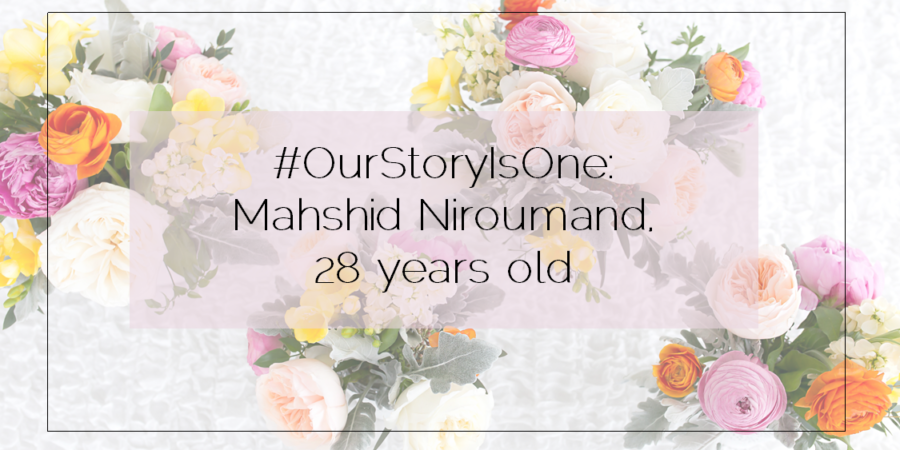At this point in the campaign, I can imagine that the stories, at least at the end, are starting to sound repetitive. As I was writing yesterday’s post, I couldn’t help but wonder if this is why we tend to tune out stories about people like these ten women. A bit like the stories of all the Black men and women who were lynched in the United States for the crime of being Black, or the stories of all the Indigenous children who were stolen from their parents and forcefully placed into residential schools; they are so horrific that to survive, it feels like we need to tune them out.
But, again, the thing about these stories is that they should not be tuned out so that they don’t happen again. These are humanity’s growing pains. We have to push through and stand witness, keep saying their names and remembering them, so that we continue our efforts to build a better world. If not, more courageous women like The Shiraz Ten, and I think of them, will be killed because they dared to question the status quo.
So say their name—Mona Mahmoudnejad, Roya Eshraghi, Simin Saberi, Shirin Dalvand, Akhtar Sabet, and today’s woman of the hour, Mahshid Niroumand. Born in Sarvestan, she was a top student and spent the last three years of her secondary education at an elite high school. She then graduated with a degree in physics from Shiraz University and had diplomas in three languages: English, German, and French.
But because she graduated university after the Islamic revolution, the university refused to issue her degree under the pretext that she owed tuition (before the Revolution, owing tuition did not disqualify anyone from graduation.) Mahshid paid the money required by the university, but was still refused her degree. She repeatedly went to the Ministry of Higher Education and the National Organization of Educational Testing but never received a clear answer as to why she was not being awarded her degree. Some officials told her verbally that the university could not issue a degree to Bahá’ís. And so, Mahshid could only make a living by privately teaching physics and chemistry, yet never succumbed to despair or discouragement.
Perhaps she took comfort, like so many around the world do, in her involvement in community-building, taking concrete action in building, slowly but surely, a better world. She volunteered as a youth advisor and a number of Bahá’í committees dedicated to service. She also was a teacher of Bahá’í children’s classes.
Mahshid was arrested on the evening of 29 November 1982 at her family home. When the agents arrived at the Niroumand family’s home, they asked for Mahshid; she introduced herself and joyfully started to gathering some clothes. The agents were perplexed by Mahshid’s joyful behavior; they cut the phone line, left the house, and returned a few minutes later to ask Mahshid and her two sisters which of them had studied physics. Mahshid answered that it was her, after which they arrested her and put her in a car. Why did the agents leave and come back? Why did they feel the need to ask Mahshid and her sisters which one of them studied physics? Didn’t they know by now that if a Bahá’í wasn’t going to lie about their beliefs to save their own life, they weren’t going to lie about their identity?
Mahshid was then taken to the Sepah Detention Centre, where she was detained throughout December, interrogated and subjected to torture. She was then transferred to Adelabad Prison. Throughout her imprisonment she was strong, steadfast, and concerned for others, often sharing the little food she was given with her fellow prisoners and encouraging them to be staunch. She was, by nature, sensitive and shy, with a calm and soothing disposition and a dignified bearing.
But when her faith was involved, she was a lioness, brave, candid and knowledgeable. One of Mahshid’s cellmates wrote that Mahshid’s interrogations were long, sometimes lasting 12 to 14 hours. But despite the intensity of these interrogations, she not only refused to denounce her faith, she also refused to name other Baha’is.
Mahshid’s sister, Mitra, recalls the last time she saw her sister, on 18 June 1983: “Mahshid came to the meeting with a smile on her face, as she always did. She said that the previous week, the prosecutor had come to the prison and had told the Bahá’ís that each one of them would be given four ‘guidance’ sessions and that anyone who converted to Islam would be released. Otherwise, they would be executed. Mahshid said ‘I was taken to the guidance sessions and I said that, according to my religious beliefs, I believe in all prophets and Imams. But I believe in the Bahá’í Faith and I believe that it is the next step in the evolutionary process of religions. I will not abandon my faith.’ She confirmed this answer in writing, signing four times, at the end of the session with the prosecutor.”
I can only imagine Mahshid, who was 28 years-old when she was executed, carrying that same smile all the way to her execution, encouraging the other nine women with her, perhaps even saying something soothing and calming. I can even imagine her saying something to the executioner, should he have tried to convince her yet again to recant her Faith, perhaps sharing one last incisive and knowledgeable precious nugget of information. But the image that stays in my mind, when thinking of Mahshid, really is of her and her sister, sitting in the prison during that last visit.
Find my entire #OurStoryisOne project here. For more information, visit the official #OurStoryisOne website, here, or follow on Instagram.

